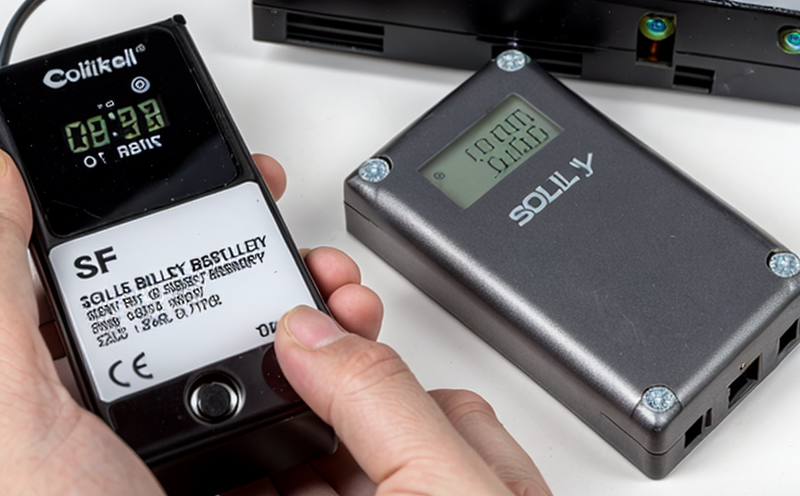BS EN 62620 Solid-State Large Lithium Cell Testing
The BS EN 62620 standard provides a framework for the testing of large lithium cells, which are crucial components in advanced battery technologies. This service focuses specifically on solid-state batteries that meet this normative requirement, ensuring compliance and performance excellence.
Solid-state batteries differ from their liquid electrolyte counterparts by using an all-solid-state design, which promises enhanced safety and energy density. The CEN standard, BS EN 62620, covers the testing of large lithium cells with a capacity exceeding 1 kWh. This service ensures that batteries are subjected to rigorous testing protocols to guarantee their reliability, performance, and safety.
The testing process involves multiple stages, including initial cell characterization, charge-discharge tests, thermal cycling, mechanical stress testing, and accelerated life testing. Each of these steps is designed to uncover potential weaknesses or hazards associated with the battery's design and manufacturing processes. The goal is not only to meet regulatory requirements but also to ensure that the battery can perform reliably in real-world applications.
One key aspect of this service is the use of specialized equipment capable of simulating various environmental conditions, such as temperature extremes, high pressures, and vibration. This allows for a comprehensive assessment of how well the cell holds up under different operational scenarios. Additionally, the testing process includes detailed monitoring of critical parameters like voltage, current, internal resistance, and heat generation.
The importance of this service cannot be overstated, especially given the growing demand for safer and more efficient energy storage solutions. By adhering to BS EN 62620 standards, manufacturers can ensure that their products are not only safe but also meet stringent quality control measures. This enhances trust among consumers and regulatory bodies alike.
The testing process is highly technical and involves precise measurement techniques and sophisticated instrumentation. Our team of experts ensures that every step of the procedure follows industry best practices, providing clients with reliable data and insights into their battery performance.
Compliance with BS EN 62620 is essential for several reasons. Firstly, it helps manufacturers meet regulatory requirements set forth by various global bodies. Secondly, adherence to these standards ensures that batteries perform consistently across different environments and conditions. Finally, compliance enhances the reputation of both the manufacturer and the product itself.
Applied Standards
| Standard | Description |
|---|---|
| BS EN 62620 | This standard specifies the testing procedures for large lithium cells, ensuring their safety and reliability. |
The BS EN 62620 standard is critical in our solid-state battery testing service. It provides a comprehensive set of guidelines that cover various aspects of cell performance, including mechanical durability, thermal stability, and electrical characteristics. By following these standards, we ensure that the batteries we test are not only safe but also capable of meeting real-world demands.
One key aspect of BS EN 62620 is its requirement for testing cells under a wide range of conditions. This includes high-temperature environments to simulate storage in hot climates and low-temperature settings to mimic cold weather scenarios. Additionally, the standard mandates testing at varying rates to assess how quickly or slowly the cell can charge or discharge.
The BS EN 62620 standard also emphasizes the importance of mechanical stress tests. These tests help identify any potential issues that could arise during transport or installation. By subjecting the cells to simulated impacts and vibrations, we can better understand their resilience against physical stresses.
Benefits
The benefits of complying with BS EN 62620 standards extend beyond mere regulatory compliance. Adherence to these standards translates into tangible advantages for manufacturers and end-users alike:
- Enhanced Safety: Solid-state batteries, when tested according to BS EN 62620, are less prone to overheating or catching fire.
- Better Performance: Rigorous testing ensures that the cells operate efficiently under diverse conditions, leading to longer battery life and better overall performance.
- Increased Reliability: By simulating real-world scenarios, we ensure that the batteries perform consistently across different environments.
- Regulatory Compliance: Meeting BS EN 62620 standards helps manufacturers avoid costly penalties and legal issues.
In summary, compliance with BS EN 62620 not only guarantees safety but also enhances the reputation of both the manufacturer and the product. It fosters trust among consumers and regulatory bodies alike, making it an essential component of our solid-state battery testing service.
Competitive Advantage and Market Impact
- Global Recognition: Adherence to BS EN 62620 standards provides a competitive edge by ensuring that products are recognized globally for their reliability and safety.
- Innovation Leadership: By staying ahead of industry trends, manufacturers can position themselves as leaders in innovation within the battery sector.
- Sustained Customer Loyalty: Satisfied customers who trust the safety and performance of their products are more likely to remain loyal over time.
- Attracting Investment: Investors are increasingly drawn to companies that demonstrate a commitment to high standards, which can lead to increased funding opportunities.
The market impact of complying with BS EN 62620 is significant. It not only ensures compliance but also helps in differentiating products within the market. In an era where safety and reliability are paramount, these standards serve as a benchmark for excellence, setting benchmarks that competitors must meet.





